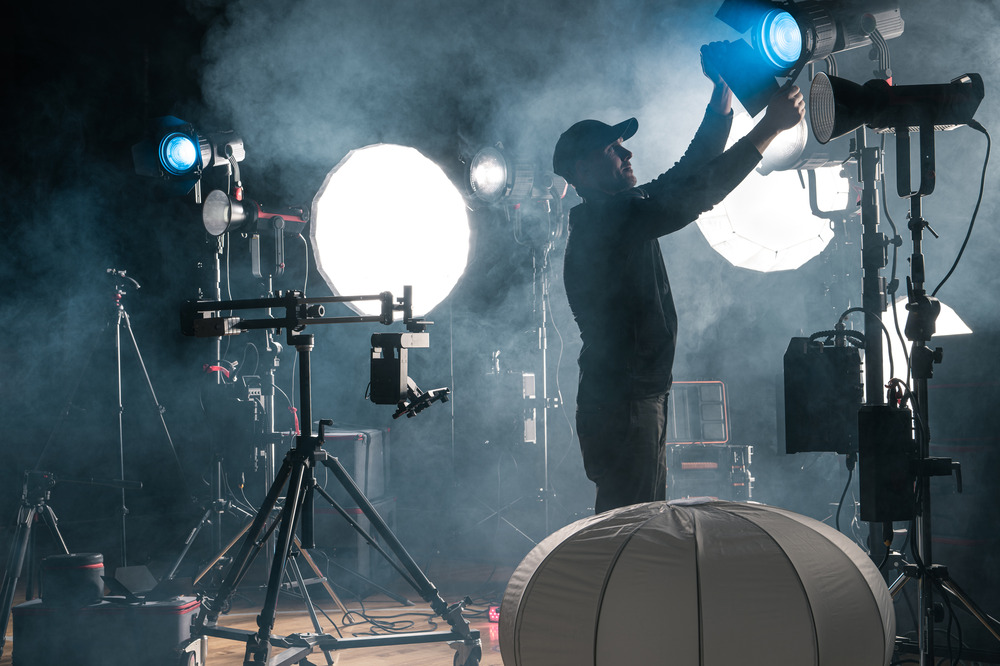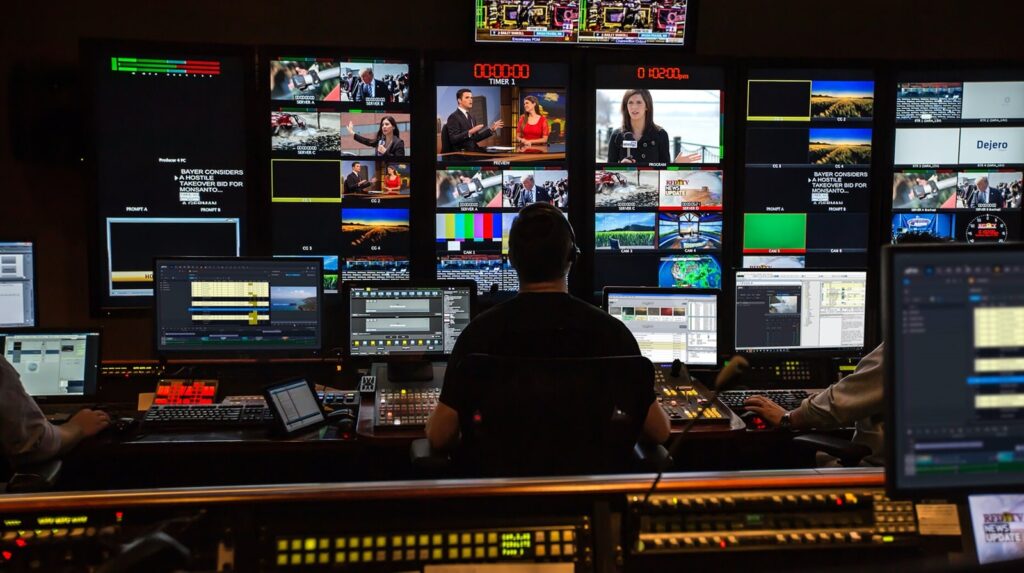GMI Flagship Programs
Online
GMI-101: Television Production Operations, Broadcasting Technologies, and Journalism
Global Media Institute
6 Months
Jan 2025
Sept 2025
About the Program
The GMI-101: Television Production Operations, Broadcasting Technologies, and Journalism is an internationally bench-marked comprehensive professional career development and advancement Program designed to provide students/learners with a solid foundation in the diverse aspects of television production. The Program explores the essential skills and techniques required to excel in the field of television production while also incorporating an introduction to TV journalism.
Students will begin by delving into the intricate world of camera operations, learning about different types of cameras, composition techniques, framing, camera movement, and shot types. They will then acquire proficiency in digital video editing, gaining hands-on experience with industry-standard editing software and exploring key editing techniques and tools.
The Program will also focus on the art of directing and scriptwriting for television, enabling students/learners to understand the dynamics of Program producing and directing. They will learn the essentials of crafting compelling scripts and effectively communicating with the production team.
Furthermore, students/learners will explore lighting engineering, discovering the fundamentals of creating desired lighting effects and setting up lighting equipment for various television production scenarios. They will gain insights into pre-production and post-production processes, including planning, organizing, and finalizing television projects.
The Program will provide an understanding of studio operations, encompassing studio layout, equipment, and management. Students will learn about the roles and responsibilities within a studio environment, further enhancing their ability to contribute effectively to television production teams.
An important aspect of the Program is the introduction to Master Control Room (MCR) operations. Students will gain insights into the crucial role of the MCR in monitoring and controlling broadcast signals, handling commercials, and scheduling programming.
Additionally, the Program will introduce students/learners to graphics and motion design in television production. They will explore the significance of visual elements in enhancing the quality and impact of television content and learn graphic design principles and techniques. Students will also gain practical experience in creating motion graphics for television.
As a part of the Program, students/learners will be introduced to the fundamentals of TV journalism. They will learn about news gathering, reporting, casting/anchoring, and ethical considerations in television journalism. This knowledge will provide them with insights into the world of news production and delivery.
Throughout the Program, students/learners will engage in practical hands-on exercises, projects, and discussions to apply their theoretical knowledge. By the end of the Program, students/learners will have developed a comprehensive skill set in television production operations, broadcasting technologies, journalism principles, MCR operations, and graphics/motion design. They will be well-prepared for entry-level roles in the television industry and equipped with the necessary knowledge and skills to excel in this dynamic field.
In addition to the 12 modules of the GMI-101 Program, students/learners will also be required to take two Units: 1. Basic Computer and Web Skills and 2. Communications and Basic Writing Skills
Professional Diploma of Technology (PDTech) in TV Production Operations, Broadcasting Technologies and Journalism
Foundation Proficiency Level
GMI-101: Television Production Operations, Broadcasting Technologies, and Journalism is an internationally bench-marked beginner-level professional career development and advancement Program designed to provide students/learners with a solid foundation in the diverse aspects of television production. Whether you have prior experience or are completely new to the field, this Program offers a comprehensive introduction to camera operations, video editing, directing, scriptwriting, lighting engineering, pre-production and post-production processes, studio operations, Master Control Room (MCR) operations, and graphics and motion design. Additionally, the Program provides insights into TV journalism principles and practices. With a focus on hands-on learning and practical exercises, this Program equips students/learners with the essential skills and knowledge to embark on a successful journey in television production, broadcasting technologies, and journalism.
Online
Six Months (24 Weeks)
GMI-101 is an internationally bench-marked intensive crash professional career development and advancement Program designed to provide a comprehensive understanding of television production in a condensed timeframe. Spanning a duration of six months (24 weeks). The Program offers a fast-paced practical learning experience that covers camera operations, video editing, directing, scriptwriting, lighting engineering, pre-production and post-production processes, studio operations, MCR operations, fundamentals of TV journalism, and graphics and motion design, among others. With a focus on practical application and hands-on projects, students/learners will gain the necessary skills and knowledge to kick-start their careers in television production, broadcasting technologies, and journalism within a shorter time frame.
The GMI-101: Television Production Operations, Broadcasting Technologies, and Journalism Program is designed for beginners and does not have specific prerequisites. However, having the following skills and knowledge can be beneficial for students/learners:
- Basic computer literacy: Students should have a fundamental understanding of operating a computer, navigating software applications, and managing files and folders.
- Communication skills: Strong verbal and written communication skills in English are essential for effective collaboration with the production team, conducting interviews, and delivering news content.
- Creativity and storytelling skills: A creative mindset and the ability to tell engaging stories are important in television production and journalism. Students should have a knack for visual storytelling and be able to think critically and creatively.
- Basic knowledge of television and media: Familiarity with television formats, genres, and industry practices will provide a foundation for understanding the various aspects of television production and broadcasting.
- Familiarity with digital technology: Some familiarity with digital technology, including digital cameras, video editing software, and online platforms, will be beneficial for understanding and applying concepts related to broadcasting technologies and operations.
- To provide students/learners with a comprehensive understanding of the fundamental aspects of television production operations, broadcasting technologies, and journalism.
- To develop essential skills in camera handling, video editing, directing, lighting, pre-production, post-production, and studio operations, enabling students/learners to effectively contribute to television production teams.
- To introduce students/learners to the principles and practices of TV journalism, including news gathering, reporting, casting/anchoring, and ethical considerations in television journalism.
- To familiarize students/learners with the operations and functions of a Master Control Room (MCR), including monitoring and controlling broadcast signals, handling commercials, and scheduling programming.
- To introduce students/learners to graphics and motion design in television production, emphasizing the importance of visual elements in enhancing the quality and impact of television content.
GMI-101 Learning Outcomes

By the end of this Program, students/learners will be able to:
- Operate cameras effectively and capture high-quality footage for television production, demonstrating an understanding of composition techniques, framing, camera movement, and shot types.
- Edit videos using industry-standard software, applying key editing techniques and tools to create coherent and visually engaging television content.
- Understand the basics of directing and scriptwriting for television, including the ability to develop compelling scripts and effectively communicate with the production team to execute creative visions.
- Implement appropriate lighting techniques for different television production scenarios, demonstrating the ability to create desired lighting effects and set up lighting equipment effectively.
- Demonstrate proficiency in pre-production and post-production processes, including planning, organizing, and finalizing television projects, ensuring smooth workflow and efficient project delivery.
- Manage studio operations, including studio layout, equipment, and management, while understanding the roles and responsibilities within a studio environment.


- Comprehend the fundamentals of TV journalism, including news gathering, reporting, casting/anchoring, and ethical considerations in television journalism, enabling students/learners to deliver accurate and responsible news content.
- Understand the operations and functions of a Master Control Room (MCR), including monitoring and controlling broadcast signals, handling commercials, and scheduling programming.
- Create and incorporate graphics and motion design elements into television production, utilizing graphic design principles and techniques to enhance the visual quality and impact of television content.
Throughout the Program, students/learners will engage in practical exercises, projects, and assessments to apply their learning and develop the necessary skills to succeed in the field of television production operations, broadcasting technologies, and journalism.
Upon successful completion of the GMI-101: Television Production Operations, Broadcasting Technologies, and Journalism Program, students/learners will be awarded the Professional Diploma of Technology (PDTech) in Television Production Operations, Broadcasting Technologies, and Journalism. This certification recognizes their proficiency and expertise in the field of television and journalism. It serves as a testament to their mastery of the techniques and concepts, equipping them with the skills necessary to pursue career opportunities in the field of modern Television and Journalism.
GMI-101 Program Structure
Module 1: Introduction to Television Production
- Overview of television production processes
- Understanding the role of different production personnel
Module 2: Camera Handling and Operation
- Camera types and functionalities
- Composition and framing techniques
- Camera movement and shot types
Module 3: Digital Video Editing Fundamentals
- Introduction to video editing software
- Basic video editing techniques and tools
- Sequencing and storytelling through editing
Module 4: TV Programme Producing, Directing, and Scriptwriting Essentials
- Basics of Program producing and directing for television
- Scriptwriting essentials for television production
- Communication and collaboration with the production team
Module 5: Sound and Lighting Engineering & Operations
- Fundamentals of sound and lighting for television
- Sound and lighting equipment and setup
- Techniques for creating desired sound and lighting effects
Module 6: Pre-Production, Post-Production, and Finishing
- Planning and organizing the production process
- Post-production workflows and techniques
- Finalizing and delivering the finished product
Module 7: Studio Operations and Management
- Studio layout and equipment
- Studio setup and maintenance
- Roles and responsibilities within a studio environment
Module 8: TV Journalism Fundamentals
- Introduction to TV news and reporting
- Ethical considerations in TV journalism
- Interviewing techniques for television
Module 9: Introduction to MCR (Master Control Room) Operations
- Role and functions of the Master Control Room
- Monitoring and controlling broadcast signals
- Handling commercials and scheduling programming
Module 10: Introduction to Graphics and Motion Design
- Importance of graphics and motion design in television production
- Graphic design principles and techniques
- Creating motion graphics for television
Module 11: Introduction to TV/Radio News Gathering, Reporting, and Casting/Anchoring
- Overview of TV/Radio news gathering and reporting processes
- Techniques for conducting interviews and gathering reliable information
- Understanding the role of casting and anchoring in delivering news content
Module 12: Web and Digital Content Production
- Importance of web and digital content in television broadcasting
- Strategies for creating engaging and interactive digital content
- Platforms, technologies, and techniques for digital content production
Throughout the Program, students/learners will have practical hands-on experience, engaging in activities and projects related to each module. They will gain a comprehensive understanding of television production processes, technical skills, creative elements, and the fundamentals of news gathering, reporting, casting/anchoring, and digital content production.



